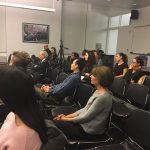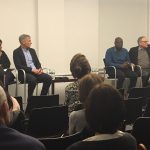A discourse on Islamist militancy in Africa
December 6, 2016 · 6-7PM
Columbia Journalism School, Pulitzer Hall, Room 607B
- Helon Habila, Author of “The Chibok Girls: The Boko Haram kidnappings and Islamist militancy in Nigeria.”
- Brian Larkin, Professor of Anthropology, Barnard College, Columbia University; Member, The Committee on Global Thought.
- Shobana Shankar, Professor of History, Stony Brook University.
- Nicholas Lemann, Dean Emeritus, Columbia Journalism School; Director, Columbia Global Reports.
Columbia Global Reports and The Committee On Global Thought welcomed Helon Habila, Barnard College and Columbia University Professor of Anthropology Brian Larkin, and Stony Brook University Professor of History Shobana Shankar, along with Nicholas Lemann, director of Columbia Global Reports, for a conversation on Islamist militancy, women, Africa, and Habila’s new book “The Chibok Girls: The Boko Haram kidnappings and Islamist militancy in Nigeria.”
Read more about CGT Book Talks.
- Audience members listen to the panelists discussion.
- Panelists from left to right: Shobana Shankar, Brian Larkin, Helon Habila, and Nicholas Lemann.
- Panelists take questions from the audience.





 es British colonialism, cross-cultural encounters, and the making of social difference and inequality in West Africa, particularly Nigeria, a nation that has experienced considerable religious violence in recent years. Her research brings an historical lens to Christian-Muslim relations, showing that religious difference has evolved out of complicated negotiations of gender, class, racial, and ethnic dynamics in the context of British and American Christian missionary work in Muslim areas. Her other work has focused on the social and cultural politics of medicine, the link between missions and UNICEF’s early efforts in sub-Saharan Africa, and, as a side interest, gender and racial hierarchies in blues music recording in Jim Crow Mississippi. She speaks Hausa, Kiswahili, Tamil, and French, and hopes to bring these skills to her next project on a history of South Asian-African exchanges of religious culture and “traditional medicines.” In addition to her academic experience, she has worked for UNICEF and Schomburg Center for Research in Black Culture.
es British colonialism, cross-cultural encounters, and the making of social difference and inequality in West Africa, particularly Nigeria, a nation that has experienced considerable religious violence in recent years. Her research brings an historical lens to Christian-Muslim relations, showing that religious difference has evolved out of complicated negotiations of gender, class, racial, and ethnic dynamics in the context of British and American Christian missionary work in Muslim areas. Her other work has focused on the social and cultural politics of medicine, the link between missions and UNICEF’s early efforts in sub-Saharan Africa, and, as a side interest, gender and racial hierarchies in blues music recording in Jim Crow Mississippi. She speaks Hausa, Kiswahili, Tamil, and French, and hopes to bring these skills to her next project on a history of South Asian-African exchanges of religious culture and “traditional medicines.” In addition to her academic experience, she has worked for UNICEF and Schomburg Center for Research in Black Culture. and currently a professor at the school. In addition, he is a staff writer for The New Yorker and author of several highly acclaimed books, including
and currently a professor at the school. In addition, he is a staff writer for The New Yorker and author of several highly acclaimed books, including